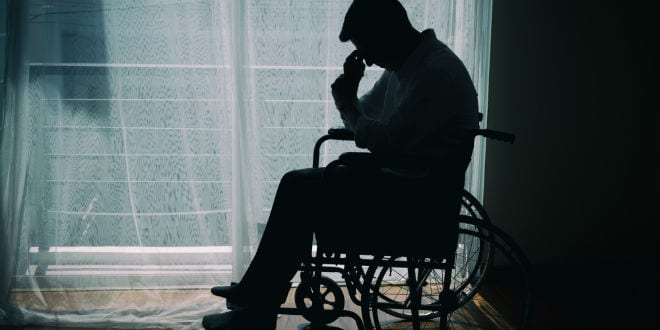As rockets, missiles, kites and balloons with burning tails land in southern Israel near the Gaza Strip and residents of the north are also potential targets, the authorities worry about the physical and emotional state of children, pregnant women, psychiatric patients and the elderly.
But it seems there is another sector in the Israeli population that has been almost ignored – those with permanent physical or sensory disabilities, who have now been found at a high risk for developing post-traumatic stress symptoms (PTSS) from terrorism and war.
A new study just published in the journal Psychological Trauma: Theory, Research, Practice, and Policy on The Impact of Exposure to War and Terror on Individuals With Disabilities by Dr. Carmit-Noa Shpigelman of the University of Haifa and Dr. Marc Gelkopf of the university and the NATAL Center for the Treatment of Victims of Terror and War in Tel Aviv.
They examined people who lived in a geographic area that was under massive missile attack or terrorist attacks in Israel during the past decade. “Even today, we are in a period of emergency situations – in the north and in the south, said Shpigelman, who teaches and researches at the university’s department of community mental health. “This situation is even worse for the disabled, so they and community service providers must be prepared in advance.”
People with disabilities who were exposed to war and terror were found to be twice as likely to develop PTSS. “This is the first time that stress responses as a result of war and terror have been examined in the context of people with disabilities, especially those with physical or sensory (blindness or deafness) disabilities. Today’s emergency situations along the borders are characterized by uncertainty and suddenness,” they wrote.
In previous studies, negative mental effects have been found as a result of prolonged exposure to war and terror events such as PTSS, anxiety, depression and dysfunction. But they examined the effects on the general population and minority groups such as new immigrants, Arab Israelis or psychiatric patients. The impact of war and terrorism on persons with disabilities in the community was not examined, the researchers said.
In this study, the University of Haifa researchers examined the impact of war and terrorism on a population coping with physical or sensory disabilities. They were divided into three groups – 151 disabled persons who lived in Israel in the past decade in a geographical area that was under a massive missile attack or many terrorist attacks; 138 without disabilities who lived in those areas; and 149 disabled people from other parts of the country who had not been directly exposed to the security threat. They recruited participants with lifelong disabilities through social disability-related organizations (mostly non-governmental organizations) and also used social networking, web forums, mailing lists and welfare and municipal services to find them.
Almost a third (28%) of the disabled who were exposed to war and terrorism were at high risk of developing PTSS, which includes frequent re-living of the traumatic event, minimal conversations, sleeping problems, nightmares, emotional numbness and avoidance of places, people and activities that reminded them of the traumatic event.
This compares to 11% of disabled people who were not exposed to the security threat and to just 8% of people without disabilities who were exposed to the security threat. A “plausible explanation” for this finding might be the elevated arousal following the stress caused by the inaccessibility of protective physical environments, a lack of real-time information and having to be dependent on others.
When the researchers examined symptoms of depression, it was found that there were no differences between people with disabilities who were exposed to war and terror events compared with people with disabilities who were not exposed to similar events. Both of these groups were at higher risk than people without disabilities.
According to the researchers, people with disabilities may experience symptoms of depression from the health problem or other life events such as barriers that limit their participation in the community and not directly as a result of war and terrorism events – since there were no differences in the levels of depression among the two groups of disabled people. Shpigelman noted that the findings highlight a lack of diagnosis of stress responses among people with disabilities in times of emergency.
Professionals, she said, “often tend to project the stress responses they identify to a person’s chronic health problem rather than to the security situation. This situation was created, among other reasons, because of a lack of awareness of the needs of this population by virtue of its being a marginalized group in society,” she continued. Israeli law requires that all public services provided to the population, including emergency services of the Home Front Command and community health services, be made available in a state of emergency.
Thus, support and training programs for disabled people must be developed based on successful activities in the past, as well as providing information on emergency services that they can contact when necessary. In addition, the researchers concluded, their findings sharpen the need to develop specialized programs for professionals to identify signs of distress and provide an adequate response for disabled persons in times of emergency.
Finally, they suggest the use of existing trauma-related infrastructures and tailoring their management to provide for these services. “In cases such as Israel, where the next war always appears to be imminent, prevention measures and practices should be developed, possibly by expanding trauma-related services to support this at-risk population,
to reduce potential distress and strengthen resilience.”



